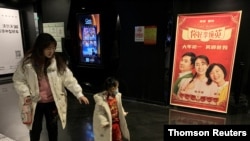For a big, boffo movie opening in China, it’s hard to beat the Lunar New Year. Box offices turn into gold mines as crowds seek out new releases during the 10-day holiday, turning film binges into an activity as traditional as family feasts.
There are seven must-see movies in this year’s holiday lineup, all Chinese productions, but there’s no “main melody film,” one that presents China and the world through the lens of China’s Communist Party (CCP), a seemingly striking omission months before the CCP commemorates its 100th anniversary in July.
But the lineup for the holiday that began Feb. 12 may reflect official interest in refining main melody films to contain less overt propaganda and attract a new generation of audiences.
“There is propaganda that deals with forging attitudes and ideas about history, and there is propaganda that simply argues that we're living in the best possible worlds,” Richard Peña, a professor at Columbia University’s School of the Arts, told VOA Mandarin via email.
“Propaganda is really in the eye of the beholder,” said Peña, who has served as program director of the Film Society of Lincoln Center and director of the New York Film Festival. “Is it propaganda when in Star Wars the old Brit passes on the sword to the young American and asks him to carry on the struggle? Sure looks like a vision of the postwar order to me!”
More prosaically, the offerings may reflect the near-term impact of the pandemic on international movie production and distribution.
COVID-19 interrupted film production for roughly half of last year, said Michael Berry, director of the Center for Chinese Studies at the University of California, Los Angeles. Though there may not be any big budget “main melody” films this Chinese New Year, “the genre certainly is not going away,” he said in an email. Nor does their absence “necessarily signal a change in policy.”
Temperature checks
This year audiences under Beijing’s COVID restrictions passed through exposure and temperature checks at theaters to fill seats with record-breaking results.
Even with 75% capacity caps on theaters, the holiday drew more than 160 million viewers who attended more than 2.9 million screenings and spent a record $1.2 billion in ticket sales, making a tenth of the global 2020 box office in just six days, according to Variety.
Kevin Yen-Ping Chu, president of the Motion Picture Development Foundation R.O.C in Taiwan, told VOA Mandarin that Beijing’s “celebrate the New Year in place” order helped break box-office records. “It’s a good time to see a movie," he said.
Last year authorities closed China’s movie theaters for the holiday to contain the coronavirus, and it wasn’t until August that The 800, among the most recent main melody films, was released.
A genre evolves
From the founding of the People’s Republic of China in 1949 through the 1980s, most films sang the main melody, meaning ideology drove plots focused on the importance of class struggle, according to Jane Yang’s article, Main Melody Recomposed.
Then came the era of biopics featuring headliners like Mao Zedong and Zhou Enlai, two founders of the CCP, and epics based on events that glorified the CCP, according to the China-focused website, Sixth Tone.
The Taking of Tiger Mountain, based on a Cultural Revolution-era Peking opera, paved the way for today’s main melody films.
The 2015 movie was unambiguously for an under-equipped unit of the People’s Liberation Army attacking the well-armed bandits. It is, as one U.S. reviewer said, “a typical guys-on-a-mission war movie,” no knowledge of Chinese history required.
Main melody films have “undergone a dramatic transformation over the past decade,” said Berry, who studies Chinese film, television and digital media. Beginning with films like The Founding of a Republic (2009) and Beginning of the Great Revival (2011), “we started to see the confluence of star-culture and propagandistic themes; with films like Wolf Warrior (2015) and Operation Red Sea (2018) we saw the next stage of this model’s development – the savvy packaging of ‘main melody’ themes with Hollywood-style action films.”
This trend, he said, culminates “in the phenomenal box office success of Wolf Warrior 2 (2017), which borrowed not only from Hollywood action films of the ’80s, but employed Hollywood actors, stunt designers, and composers to make a popcorn flick that also emphasized the correct core values and told ‘the good China story.’”
In Wolf Warrior 2, Chinese forces are gung-ho for the good of Africa. This meshed with China’s interest in burnishing its image there. The blockbuster earned nearly $900 million in theaters.
But as the genre evolved, controversy crept in. The 800, released in August, depicted Chinese forces battling Japanese soldiers invading Shanghai in 1937, in what is sometimes called the start of World War II. Political wrangling dogged the film and delayed its premiere.
“It appears that portrayals of Communist Party history are more sensitive than more contemporary topics, such as drug use and disaffection,” said Variety in announcing the release date.
Missing message?
During this year’s Lunar New Year film binge, it’s difficult to see a political message in the two top hits.
Detective Chinatown 3 is the big title, the latest offering from a caper comedy-action franchise launched in 2015 by Wanda Pictures. A buddy film, it stars Liu Haoran, as a crime-busting wonder and Wang Baoqiang as his broadly defined “uncle” and bumbling sidekick. The first-day box office topped $130 million, and the final tally for the holiday was $550 million, according to Variety, which quoted Alibaba’s Beacon industry data tracker.
The surprise break out is Hi, Mom, written, directed by and co-starring female filmmaker Jia Ling. She plays a devoted daughter, who after her mother dies suddenly, is transported back to 1981, where she meets her mother, played by Zhang Xiaofei.
Word of mouth propelled sales to $422 million for the holiday, according to Variety and Beacon.
Weng Huangde, executive director of the Taiwan Film Critics Society, told VOA that as Chinese movies have become more commercial, it is more difficult to identify a main melody film.
Commercialization meant films appealed more to audiences than the CCP, and in what Yang, the author, called “extreme cases, some main melodic blockbusters even de-emphasized the political aspect and chose to focus on the production techniques and storytelling during the promotion process.”
Storytelling was key to My People, My Country, said Weng. The 2019 hit did not follow “the old format of praising the government. Instead, it was about regular people. … Even if your ideology is different from that of the Chinese Communist Party, you were moved by the characters.”
The omnibus film produced the year of China’s 70th anniversary, includes seven stories of ordinary people involved in seven key events since 1949.
Weng said authorities carefully orchestrated the focus, knowing many viewers don’t appreciate movies that hammer home praise for the government.
“So they hide it in the subject matter … so that you can't see it on the surface, you won’t realize it until the movie is over. I think this is the trend of the Chinese movie – hiding the government’s ideology in different subjects without being noticed,” he said.
Pandemic’s impact
Or in this pandemic year, are authorities aware that Chinese people may be sick of hearing the government tell them how well it works on their behalf?
“As for audience sentiments: that can be a difficult thing to gauge,” said UCLA’s Berry. “There are certainly some audiences who are sick of formulaic propaganda films, but there are also just as many patriotic young Chinese who are only all too willing to support these kinds of films. The Chinese success in controlling the COVID-19 outbreak has also bolstered patriotic sentiments for many Chinese, potentially creating an even larger market for these types of films.”
Before the pandemic, Hollywood used the Lunar New Year to release its offerings to Chinese audiences.
This year and last, Hollywood release dates have been scrambled or postponed because of COVID-19.
The result is a Lunar New Year movie mania focused on Chinese productions. With the Chinese movies breaking box-office records, Hollywood is on notice that the market can do without its exports, which were already suffering from Trump-era trade tussles.
“Hollywood is in a precarious position,” Berry said. The pandemic has hurt U.S. production and the domestic box office, he explained, and the U.S.-China trade war “has led many patriotic young Chinese audience members to turn their backs on U.S. cultural products.”
With most U.S. theaters closed amid COVID-19, “Hollywood is more reliant than ever on the Chinese box office, but Chinese audiences aren’t buying,” Berry added. And though Hollywood “is heavily reliant upon the global market, the Chinese box office is self-sufficient” and can make films at a fraction of the cost.
Pena suggested that “when Hollywood films become easily available again, they will once again connect powerfully with the Chinese public. But that's always hard to guarantee, as the PRC market remains so controlled.”
Or as Weng said, “The performance of Chinese movies during this Lunar New Year may determine Hollywood’s policy toward the Chinese movie market in the future. The movie market this year may also determine which direction Chinese movies will go in the future.”





